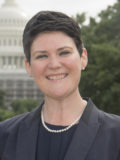
By BJC Executive Director Amanda Tyler
 Questioning in a Capitol Hill hearing this week took a troubling turn. No, not “the” hearing with Former FBI Director James Comey that interrupted regular broadcasting and had the attention of millions of Americans in the middle of a workday. I’m referring to a confirmation hearing for Russell Vought, President Donald Trump’s nominee for deputy director of the White House Office of Management and Budget.
Questioning in a Capitol Hill hearing this week took a troubling turn. No, not “the” hearing with Former FBI Director James Comey that interrupted regular broadcasting and had the attention of millions of Americans in the middle of a workday. I’m referring to a confirmation hearing for Russell Vought, President Donald Trump’s nominee for deputy director of the White House Office of Management and Budget.
Sen. Bernie Sanders questioned Vought regarding theological views Vought wrote in a 2016 article. In that post, Vought supported his alma mater Wheaton College’s firing of professor Larycia Hawkins for her statements in support of Muslims. Vought wrote, “Muslims do not simply have a deficient theology. They do not know God because they have rejected Jesus Christ his Son, and they stand condemned.”
Sanders’ line of questioning imposed a religious test, which is forbidden by Article VI of the Constitution. I share the outrage voiced by the Southern Baptist Convention’s Russell Moore, National Review writer David French and others regarding the exchange. Sanders went so far as to even question Vought’s fitness for citizenship, saying he “is really not someone who is what this country is supposed to be about.” These comments violate the spirit of the Constitution, as did those of Sen. Chris Van Hollen when, in his defense of Sanders, Van Hollen said that Vought’s comments “suggest a violation of the public trust.”
Giving them both the benefit of the doubt, maybe they confused religious exclusivism with political exclusivism. That is an extremely unfortunate but understandable mistake, given the current state of our world where political exclusivism is evident both in authoritarian regimes around the globe and in nativist rhetoric and violence, rampant in democratic societies including our own. The senators may have been seeking to be assured that Vought shared their view of political pluralism, exemplified in our constitutional order and its bedrock principle of religious freedom for all, where no faiths are treated as second class. Such a line of questioning would have been entirely proper, particularly given contrary views expressed by others in this administration.
But Sanders veered far from that course in cross-examining Vought about his theological views. Most – though certainly not all – Christians, Jews, and Muslims probably could be described as religious exclusivists. Vought’s prior writings and testimony suggest that he is fairly described as one. Russell Moore summarized this common position in his press statement “that all Christians of every age have insisted that faith in Jesus Christ is the only pathway to salvation.” Sen. Van Hollen provided the contrary perspective at the hearing, self-identifying as a religious pluralist when he said, “I’m a Christian, but part of being Christian, in my view, is recognizing there are lots of ways people can pursue their god.”
Protestant theologian Miroslav Volf, who has written extensively on this topic in his recent book Flourishing: Why We Need Religion in a Globalized World, provides clarity desperately needed when he explains that religious exclusivists can be political pluralists at the same time. Volf’s preeminent example of such a person is Roger Williams, whom he describes as the “father of political pluralism” as well as “an intransigent defender of religious truth if ever there was one.” Williams, who founded both Rhode Island and the First Baptist Church in America, helped establish religious freedom as a core value for our country.
In his statements both during and after the hearing, Sanders seems to conflate Vought’s religious exclusivism with political exclusivism. In other words, because Vought entered into a public theological debate and wrote that Muslims “stand condemned,” Sanders concluded that was Islamophobic and discriminatory. I share Miroslav Volf’s optimism that this is not a forgone conclusion, but by focusing on the wrong questions, Sanders missed an opportunity to clarify this point and instead engaged in religious bigotry of another kind.
We have seen other recent examples of attempts to declare certain religious beliefs as irreconcilable with American values and therefore legitimate grounds for exclusion. Part of living in a religiously diverse society is encountering people who have theological views that are opposed, even abhorrent, to us. Our founders created a system through the Constitution and Bill of Rights that provides equal citizenship despite those differences. Though this value was challenged in the exchange at this week’s congressional hearing, it provides a new opportunity to redouble our efforts to defend political pluralism and religious freedom for all. There is room for both religious exclusivists and religious pluralists in this fight.
Amanda Tyler is the executive director of the Baptist Joint Committee for Religious Liberty.




